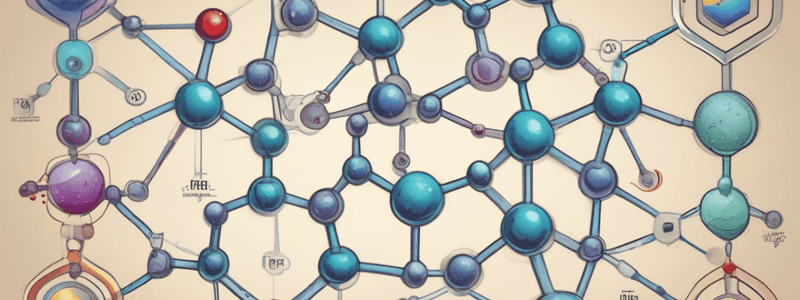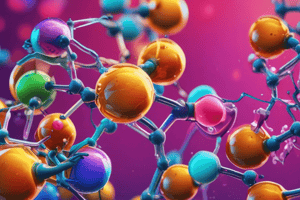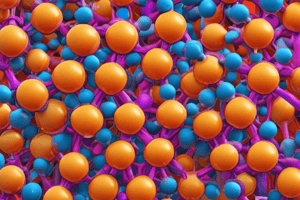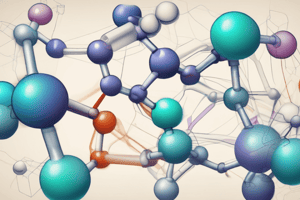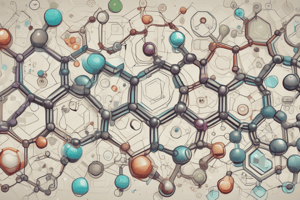Podcast
Questions and Answers
What is the product of the reaction of pyrrole with CHCl3 and strong alkali?
What is the product of the reaction of pyrrole with CHCl3 and strong alkali?
- Formylation at position 3
- Formation of 2-chloro pyrrole
- Formylation at position 2 and formation of 3-chloro pyridine (correct)
- Formation of amines
What is the product of the reaction of pyrrole with aldehydes and ketones in acidic medium?
What is the product of the reaction of pyrrole with aldehydes and ketones in acidic medium?
- Porphyrin
- Dipyrryl methane (correct)
- Dipyrryl ethane
- Tetramer
What is the order of reactivity in five-membered heterocycles?
What is the order of reactivity in five-membered heterocycles?
- Thiophene > Pyrrole > Furan > Benzene
- Pyrrole > Thiophene > Furan > Benzene
- Furan > Thiophene > Pyrrole > Benzene
- Pyrrole > Furan > Thiophene > Benzene (correct)
What is the name of the reaction that forms a 3-chloro pyridine from pyrrole?
What is the name of the reaction that forms a 3-chloro pyridine from pyrrole?
What is the name of the reaction that forms amines from pyrrole?
What is the name of the reaction that forms amines from pyrrole?
What is the structure of the tetramer formed by the reaction of pyrrole with aldehydes and ketones?
What is the structure of the tetramer formed by the reaction of pyrrole with aldehydes and ketones?
What is the condition required for the reaction of pyrrole with aldehydes and ketones?
What is the condition required for the reaction of pyrrole with aldehydes and ketones?
Which heterocycle is the most aromatic?
Which heterocycle is the most aromatic?
Why is pyrrole more reactive towards electrophiles?
Why is pyrrole more reactive towards electrophiles?
Why is furan less reactive than pyrrole towards electrophiles?
Why is furan less reactive than pyrrole towards electrophiles?
Why is thiophene less reactive than furan towards electrophiles?
Why is thiophene less reactive than furan towards electrophiles?
What is the order of reactivity of heterocycles towards electrophiles?
What is the order of reactivity of heterocycles towards electrophiles?
What is the position of nitration in furan when reacted with a mild nitrating agent?
What is the position of nitration in furan when reacted with a mild nitrating agent?
What is the preferred site of electrophilic attack on furan?
What is the preferred site of electrophilic attack on furan?
What is the reason for the lower reactivity of benzene towards electrophiles?
What is the reason for the lower reactivity of benzene towards electrophiles?
What is the order of stability of the transition states in heterocyclic ring reactions?
What is the order of stability of the transition states in heterocyclic ring reactions?
What is the reason for the lower reactivity of phenol compared to aniline?
What is the reason for the lower reactivity of phenol compared to aniline?
Why does furan tend to give addition products rather than substitution products?
Why does furan tend to give addition products rather than substitution products?
What is the main factor that determines the reactivity of heterocycles towards electrophiles?
What is the main factor that determines the reactivity of heterocycles towards electrophiles?
What is the relative reactivity of thiophene and furan towards electrophiles?
What is the relative reactivity of thiophene and furan towards electrophiles?
Why is electrophilic substitution in thiophene much easier than in benzene?
Why is electrophilic substitution in thiophene much easier than in benzene?
Which of the following compounds is the most aromatic?
Which of the following compounds is the most aromatic?
What is the correct order of reactivity in electrophilic substitution in comparison to benzene?
What is the correct order of reactivity in electrophilic substitution in comparison to benzene?
Which positions are more reactive in pyrrole?
Which positions are more reactive in pyrrole?
Why does the intermediate from electrophilic attack at C2 in pyrrole have more resonance structures?
Why does the intermediate from electrophilic attack at C2 in pyrrole have more resonance structures?
Which of the following compounds does not undergo Friedel-Crafts alkylation?
Which of the following compounds does not undergo Friedel-Crafts alkylation?
What is the reason for the acid sensitivity of furan in Friedel-Crafts alkylation?
What is the reason for the acid sensitivity of furan in Friedel-Crafts alkylation?
What is the condition required for Friedel-Crafts alkylation of furan substituted with electron-withdrawing substituents at the position-2?
What is the condition required for Friedel-Crafts alkylation of furan substituted with electron-withdrawing substituents at the position-2?
What is the role of mild catalysts such as phosphoric acid or boron trifluoride in Friedel-Crafts alkylation of furan?
What is the role of mild catalysts such as phosphoric acid or boron trifluoride in Friedel-Crafts alkylation of furan?
What is the major difference between the reactivity of pyrrole and benzene in electrophilic substitution reactions?
What is the major difference between the reactivity of pyrrole and benzene in electrophilic substitution reactions?
What is the primary reason for the difference in reactivity between the 2 and 3 positions in pyrrole?
What is the primary reason for the difference in reactivity between the 2 and 3 positions in pyrrole?
Which of the following heterocycles is least reactive towards electrophiles?
Which of the following heterocycles is least reactive towards electrophiles?
What is the role of electron-withdrawing substituents in the Friedel-Crafts alkylation of furan?
What is the role of electron-withdrawing substituents in the Friedel-Crafts alkylation of furan?
Why does furan not undergo Friedel-Crafts alkylation under normal conditions?
Why does furan not undergo Friedel-Crafts alkylation under normal conditions?
What is the relative order of aromaticity of the five-membered heterocycles?
What is the relative order of aromaticity of the five-membered heterocycles?
What is the primary reason for the difference in reactivity between pyrrole and furan towards electrophiles?
What is the primary reason for the difference in reactivity between pyrrole and furan towards electrophiles?
What is the role of mild catalysts in the Friedel-Crafts alkylation of furan?
What is the role of mild catalysts in the Friedel-Crafts alkylation of furan?
Why is pyrrole more reactive than benzene towards electrophiles?
Why is pyrrole more reactive than benzene towards electrophiles?
What is the relative order of reactivity of the five-membered heterocycles towards electrophiles?
What is the relative order of reactivity of the five-membered heterocycles towards electrophiles?
What is the primary reason for the difference in reactivity between the 2 and 5 positions in pyrrole?
What is the primary reason for the difference in reactivity between the 2 and 5 positions in pyrrole?
Study Notes
Heterocyclic Ring Reactions Overview
- Heterocyclic compounds resemble phenols in several reactions.
- Key reactions include the Riemer-Tiemann reaction and Kolbe-Schmitt reaction.
Riemer-Tiemann Reaction
- Involves pyrrole reacting with CHCl3 and strong alkali.
- Produces formylation at position 2 or formation of 3-chloro pyridine.
- Generates carbine, leading to a carbine insertion reaction.
Reaction of Pyrrole with Aldehydes and Ketones
- Pyrrole condenses with aldehydes/ketones in acidic medium.
- Initially forms dipyrryl methane, which can polymerize to tetramers (porphyrinogens).
- Porphyrinogens are stable, planar structures that accommodate metal ions.
Reactivity Comparison of Five-Membered Heterocycles
- Reactivity order: Pyrrole > Furan > Thiophene > Benzene.
- Aromaticity order: Benzene > Thiophene > Furan > Pyrrole.
- Pyrrole's greater reactivity is due to electron-rich carbon atoms and stabilization of positive charge on tetravalent nitrogen.
Furan Reactivity
- Furan is reactive but less than pyrrole, primarily at C-2.
- Oxygen's electronegativity results in less stability of the positive transition state compared to nitrogen in pyrrole.
Thiophene Reactivity
- Thiophene is less reactive than furan, attributed to sulfur’s lower electronegativity.
- The mesomeric effect of sulfur is smaller than that of oxygen, leading to weaker electron release from the aromatic system.
Benzene vs. Heterocycles Reactivity
- Electrophilic substitution in thiophene is easier than in benzene.
- Benzene shows lower reactivity due to higher resonance stabilization energy and transition state energy.
- Benzene's transition state stability is lower compared to five-membered heterocycles.
Aromaticity and Substitution vs. Addition
- Furan's lower aromaticity can lead to preferential formation of stable C-O bonds over substitution products.
- Aromaticity decrease generally favors addition reactions over substitution reactions.
Studying That Suits You
Use AI to generate personalized quizzes and flashcards to suit your learning preferences.
Related Documents
Description
Test your knowledge of heterocyclic ring reactions, focusing on pyrrole and its reactions with aldehydes and ketones, as well as its resemblance to phenol. Learn about the Riemer Tiemann reaction and more. Assess your understanding of pyrrole's reactivity and comparison with benzene.
